 Petzlover
PetzloverAsian is originated from United Kingdom but Van Kedisi is originated from Turkey. Both Asian and Van Kedisi are having almost same weight. Both Asian and Van Kedisi has almost same life span. Both Asian and Van Kedisi has same litter size. Asian requires Low Maintenance. But Van Kedisi requires Moderate Maintenance
Known also as the Malayan, the Asian cat is likened to the Burmese but just with different coat patterns and colors.
This particular cat breed was developed in 1981 in the UK. Apparently there was a mistake mating between a Lilac Burmese and a Chinchilla Persian and kittens from these were born in 1981.
So beautiful were they that a breeding program started with new coat colors and patterns. The breed got the name ‘Asian’ with all the varieties reaching GCCF Championship status.
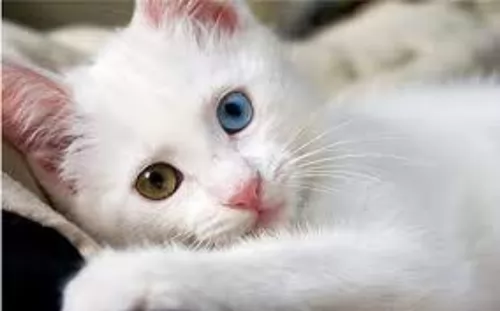 The Van Kedisi cat or Cat of Van as it is also known is a domestic cat that hails from the Lake Van region of Turkey.
The Van Kedisi cat or Cat of Van as it is also known is a domestic cat that hails from the Lake Van region of Turkey.
There are historians who agree that the domestic cat originated in Egypt. The actual cat was developed in the United Kingdom from a host of cat types from Turkey. During the late 1990s the Van Cat became an informal municipal symbol of the city.
The Asian cat is medium-sized and muscular. The male cat is somewhat bigger than the female and weighs roughly 5 – 7kg while the female will weigh roughly 3 – 5kg although most times, there is not much difference in size between the males and females.
The attractive cat has a round head and wide-spaced ears with large green eyes. It’s a slender cat, but athletic with slender legs and medium thickness tail. Asian cats come in a wide range of colors such as fawn, chocolate, black, blue, cinnamon. The coat is short, fine, and silky and the Asian doesn’t require too much grooming.
These are friendly, playful cats and they get on well with children if the children are kind, gentle and respectful with him. This is a fairly dependant cat and he will actually follow his favorite human being, crying out for attention.
The Asian is a social cat and can fit well into different homes. However, because it is a social cat, they require an owner that is willing to spend time with them. They’re cats that are sensitive to the moods of their owners and make excellent companions.
They’re adventurous cats and enjoy exploring and traveling, voicing their opinion on different things as well. The Asian thrives on the attention it gets from their human owners. It’s a sociable cat and is quite talkative too.
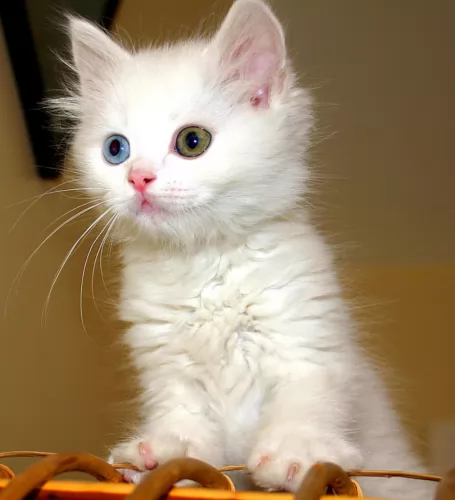 The Van Kedisi cat is a large feline with a soft, silky white coat, which he often sheds in the Summer. There is usually color on the head and tail – a yellow apricot color. The coat is descibed as seni-long.
The Van Kedisi cat is a large feline with a soft, silky white coat, which he often sheds in the Summer. There is usually color on the head and tail – a yellow apricot color. The coat is descibed as seni-long.
He can reach up to 10kg in weight. The cats are lean and long-legged and they also like to swim. The eyes are almond-shaped eyes and are often odd-colored. One eye might be green and the other blue.
Van Kedisi cats have a strong wild side to them, but in spite of this they love getting attention from their human owners. In fact, they demand it or else they can become disgruntled. It's the kind of cat that can adapt to new environments and he is intelligent enough to be able to be trained.
The Asian cat is such a sweet animal – gentle and affectionate and also very sociable. They are also curious and intelligent and vocal enough to let you know their needs. They're strong-willed if they want something.
The Asian makes an excellent companion for singles, couples, families or the elderly. They also get on well with children and with other pets in the home.
There are quite a few Asian cat varieties and each one promises to make you an excellent companion.
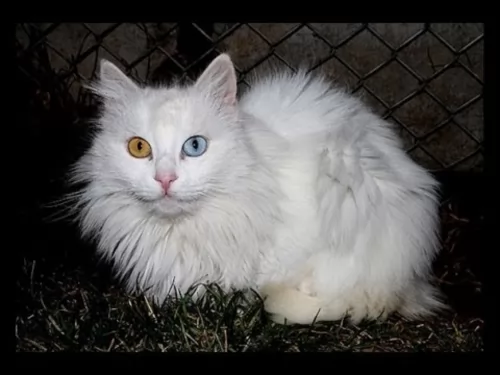 They are lively cats and love playing games with their humans. They will need stimulation from interactive toys. He also loves to leap up onto high perches and watch things from his elevated position.
They are lively cats and love playing games with their humans. They will need stimulation from interactive toys. He also loves to leap up onto high perches and watch things from his elevated position.
If you have decided to have a Van Kedisi in your home, expect things to joyful and entertaining as this cat likes to build a strong bone with his human owners.
Although there are no specific health issues with this cat, because of it being associated with the Burmese, it may be more susceptible to diabetes mellitus than other breeds.
There are many cats in modern times developing diabetes mellitus – where they are unable to produce enough insulin to balance blood sugar. If the disease goes untreated it can lead to dehydration, vomiting, depression, weight loss, and even death. Your cat will be thirsty and urinating more frequently. There are various treatments and the diet for the cat will need to change too.
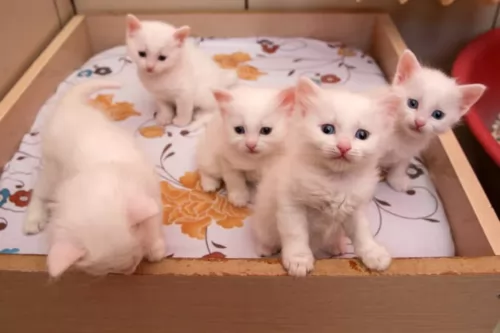 A healthy meat diet for your cat is like a ticket to good health. Cats are carnivores and they rely on you to supply them with food high in protein.
A healthy meat diet for your cat is like a ticket to good health. Cats are carnivores and they rely on you to supply them with food high in protein.
Cats battle to absorb protein derived from plants. Learn to check your food labels to ensure the food contains animal meat. Meat from chicken and tuna is good.
Regular visits to the vet when you suspect that your cat is ill will give you the chance to catch any diseases in their early stages.
To take care of the cat’s shiny coat, you can gently brush your Asian every week, not more, as they are short-haired cats, they’re not heavy shedders and they are low maintenance.
Age and general health will influence the way you feed your Asian cat. You’ll want to be feeding your feline friend the very best food there is as this will contribute towards his good health.
If you opt to feed your cat a commercially manufactured cat food, higher protein levels in wet foods might be better for your carnivorous pet. You don’t want to provide your cat with a high protein diet that is deficient in amino acids.
That is why it is important to research cat foods and their ingredients and get to know what are the most important ingredients for your cat to be getting. At all costs, avoid your cat becoming obese.
Make sure your cat has access to fresh cool water to maintain his body temperature.
Check your cat’s teeth, as he can’t convey to you that he is in pain – you need to check inside his mouth. Redness inside his ears might be indicative of an ear infection.
Whenever your cat seems to be ill, get him to the vet.
Provide your cat with a litter box that is kept hygienically clean.
Provide your cat with food- and water bowl, a brush for grooming and warm, dry sleeping basket.
Have your Asian neutered or spayed to prevent unwanted kittens.
Make sure your cat’s vaccines are up to date.
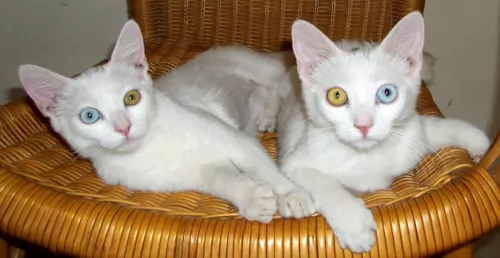 Brush your Van Kedisi each week because the semi longhair can become matted and tangled if not brushed each week.
Brush your Van Kedisi each week because the semi longhair can become matted and tangled if not brushed each week.
The Van Kedisi will need to be vaccinated. As a kitten he will need to be vaccinated against deadly cat diseases. While at the vet he will also be dewormed.
As your cat matures, you will need to make sure that he is free from parasites. Ticks, fleas, and heartworm can cause havoc with your pet and the vet can advise you on a treatment plan.
Have your cat neutered or spayed as not only will it prevent unwanted kittens, but the procedure can have health benefits for your cat too. It can eliminate the possibility of your cat getting some of the many cancers there are. Spaying and neutering also has a positive impact on your cat’s personality.
These are big, strong cats and the temptation will be to overfeed him. They enjoy their food and can easily put on weight. Obesity can bring about many different diseases in your cat.
It is up to you as a responsible cat owner to ensure your ca doesn’t put on a lot of weight but rather maintains a healthy weight. You should also make sure that your feline friend gets regular exercise through playing, walking, and even swimming. These cats enjoy a swim, particularly when it is with their human owners.
Provide your cat with attention and play with him every day. They are playful, intelligent cats and it boosts his morale to have his favorite human playing with him.
Allow opportunities for scratching and climbing. The Van Kedisi loves to climb and scratch – two natural behaviors of cats. Supply him with a scratching post and a climbing tree to get the exercise he needs.